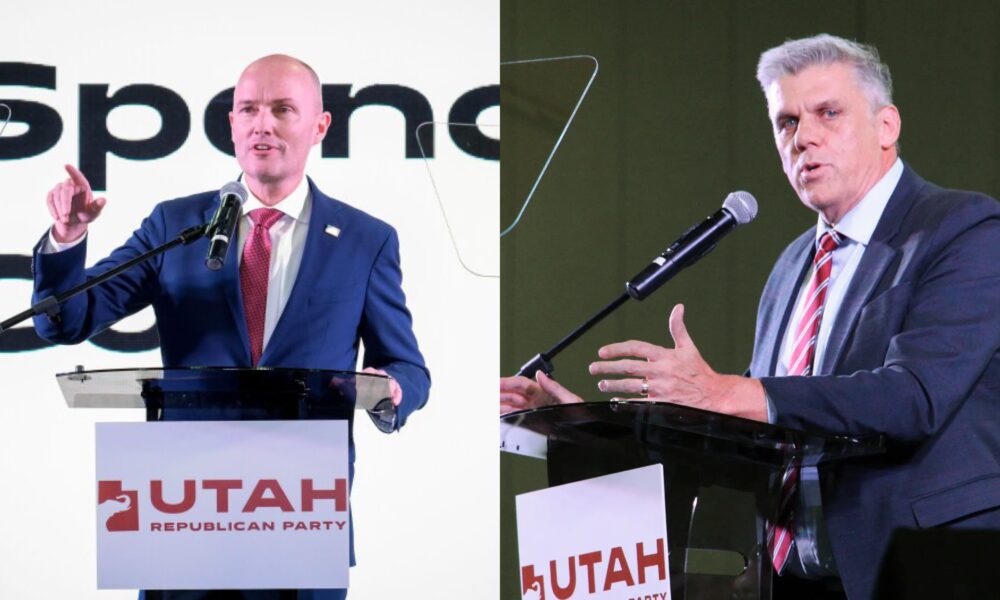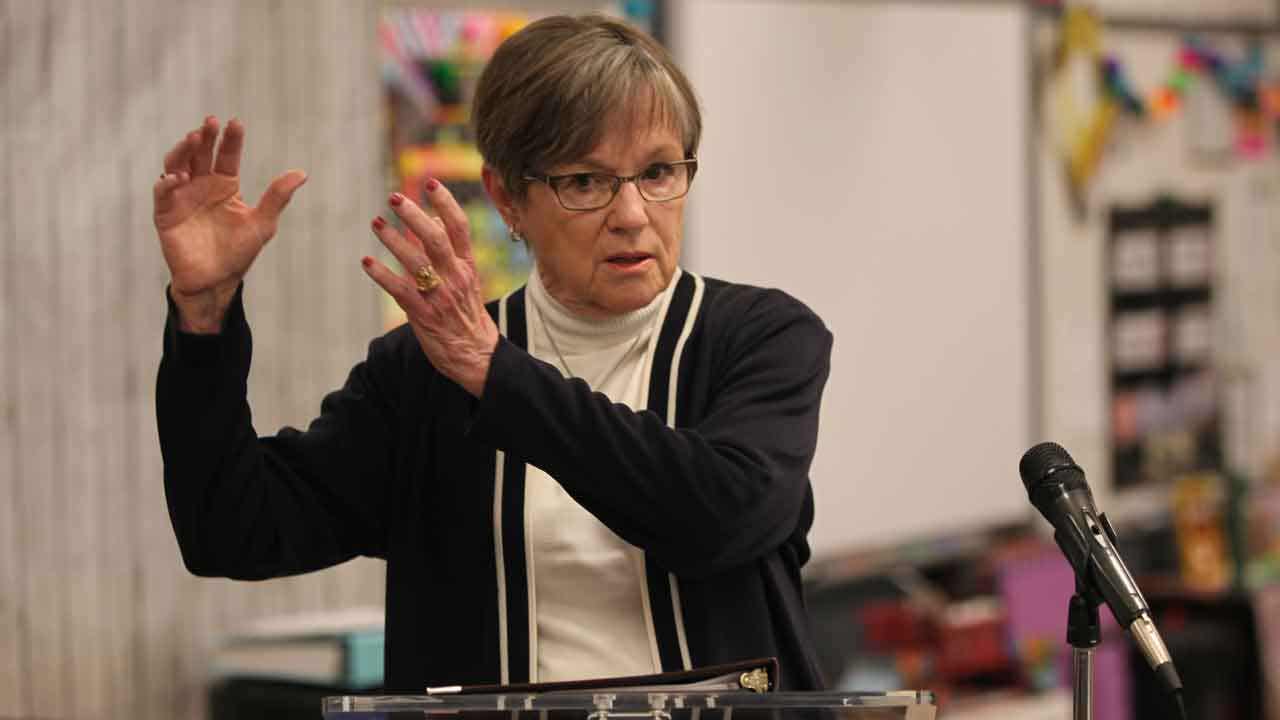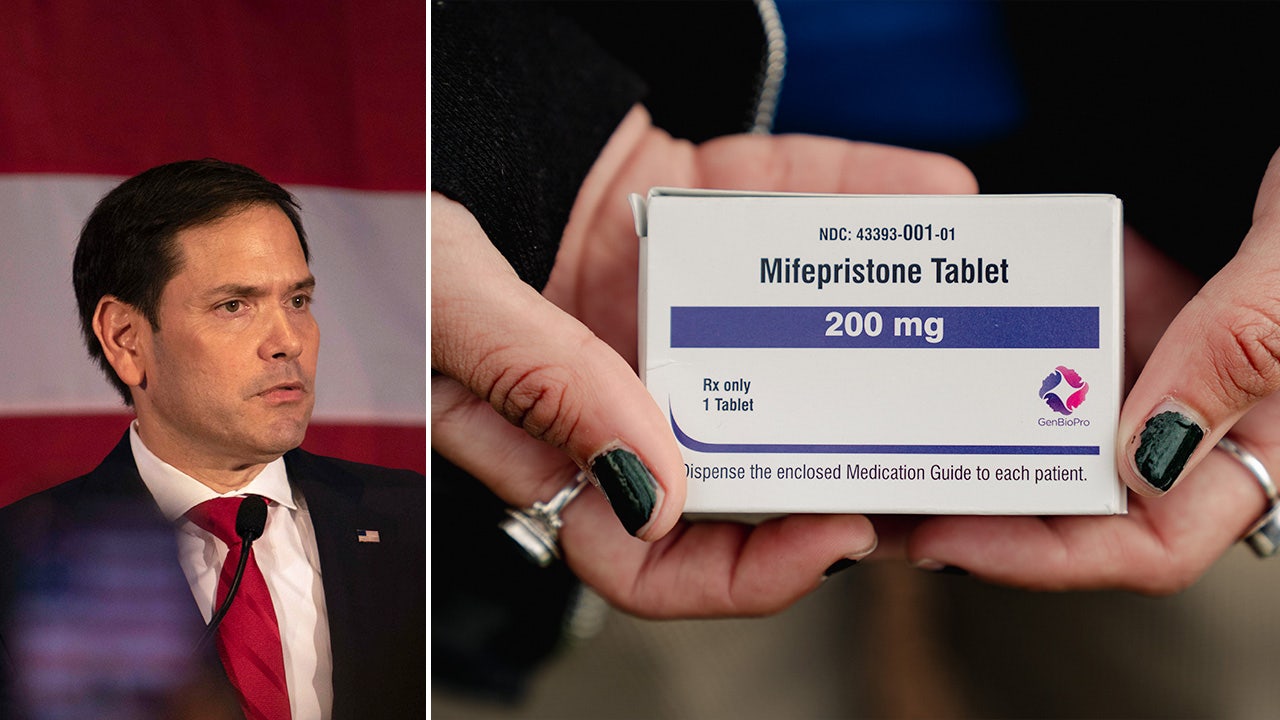Utah
Conservatives have lost trust in elections. Here’s how Utah leaders are trying to help
Utah leaders are at the forefront of a nationwide initiative to increase election confidence among conservative voters.
The state’s top election officers, Lt. Gov. Deidre Henderson and her director of elections, Ryan Cowley, spoke at a Sutherland Institute event on Tuesday along with the man behind an ambitious project to bring together hundreds of election administrators and scholars across the country to promote “a conservative agenda for democracy.”
Scott Warren, who leads the joint program from the SNF Agora Institute at Johns Hopkins University and the center-right think tank R Street, presented the initiative’s “conservative principles for building trust in elections” in a message that was echoed by Henderson, Cowley and former Utah Gov. Gary Herbert.
“Voter access and ballot security are paramount, especially in the age of some saying elections are illegitimate or have been stolen,” Herbert said in a prepared video statement. “Unfortunately, this has become an all too common feature of campaigns and it undermines our system of self government.”
Herbert called on attendees to adopt the principles developed by the Agora Institute and R Street partnership, which Henderson and the Sutherland Institute have been involved with since shortly after it was formed about 18 months ago. The principles are: 1) publicly affirming the integrity of elections in Utah and across the country, 2) using transparency and outreach to boost election confidence, and 3) inviting continuous improvement in election processes to increase trust in election results.
As part of the event held at Utah Valley University, Warren released new polling data commissioned by the partnership on Utahn’s election confidence, candidate preferences and media consumption.
Do Utahns trust federal elections?
The poll, conducted by Gallup in March, found that a majority of Utahns who identify as “conservative” are not confident that President Joe Biden was the legitimate winner of the 2020 presidential election. Only 17% of Utah conservatives are “very confident” that Biden won fairly and 20% were “confident.” Over 30% were “not too confident” and another 30% were “not at all confident.”
The distinction between conservatives who believe Biden’s win was legitimate and those who don’t correlates with other divides among conservatives. Utah conservatives who believe Biden won are more likely to have voted in 2020 (82%) than those who don’t believe he was the legitimate winner (62%), the poll found. They are also more likely to have always been a Republican, 70%-61%.
The divide extends to feelings surrounding the 2024 election: 90% of Utah conservatives who believe Biden’s win was legitimate, and 53% of those who don’t, have some or a lot of confidence that other states’ legislatures will certify the winning presidential candidate in 2024 “regardless of party.” 51% of Utah conservatives who believe Biden’s win was legitimate, and just 19% of those who don’t, think that Democrats will accept the 2024 presidential election if they lose.
Utah conservatives who believe Biden won the 2020 election are unique in the nation in describing themselves as Romney Republicans (31%) or Never Trump Republicans (25%) and are twice as likely, at 39%, than that same cohort in any other state polled by Johns Hopkins and R Street to say they will vote for someone other than Trump and Biden in 2024, the poll found.
Nearly 80% of Utah conservatives who don’t believe Biden won the 2020 election fair and square say they will vote for Trump in 2020, compared to just 36% of conservatives who have confidence in the results of the 2020 election.
Do Utahns trust state elections?
Utahns are much more united in their perception of their own state’s election integrity.
Election policy scholar Derek Monson presented a Sutherland Institute poll conducted by Y2 Analytics in February which found over 70% of Utahns have confidence that the state’s decade-old vote-by-mail system counts ballots accurately, produces fair outcomes and is secure.
The same percentage of Republicans say they like how vote-by-mail allows them to avoid lines at polling places but around half of Republicans are worried about mail-in ballots being hard to track or being sent to the wrong home.
“There’s a high level of confidence that elections in Utah are accurate and receive fair outcomes and that they’re secure,” Monson said.
The state’s mature vote-by-mail laws and willingness to pursue reforms to increase election integrity have made Utah an example for the country on election administration, Monson said. This is why the Agora Institute-R Street initiative convened officials and academics from across the country in Park City a year ago to talk about how Utah election officials are doing their job and “persuading Republicans to kind of resist the erosion of trust in things like election outcomes.”
Henderson and Cowley invited Utahns to come and see the processes that build democracy to remind them who it is that makes elections tick: their neighbors.
“As we move into the 2024 election, it’s essential for all of us to continue to promote Utah’s strong track record of election integrity while we strive to continue to improve things so citizens can continue to have high levels of trust in our voting system,” Henderson said in a prepared video statement. “It’s important to remember that elections are not done at a national or even a state level. They’re performed at the local level by our neighbors and members of our communities.”
Cowley, who oversaw elections in Summit and Weber counties before joining the lieutenant governor’s office, lamented the loss of institutional knowledge that has taken place with 20 of Utah’s 29 county clerks leaving since 2020 because of the unprecedented pressure and harassment directed toward local election officers.
According to Cowley, distrust in elections is bipartisan and has more to with whatever the results were of the most recent election than with a faulty election system.
“I think it’s honestly a mechanism of when the polling is done,” Cowley said. “If you were to go back four years, when you have a Republican President and Democrats lost the election, I think the polling would show probably an inverse number.”
Cowley said the best way to improve confidence in elections is to increase transparency surrounding election processes, invite community members to watch their neighbors oversee vote counting and gradually reform the election system based on public feedback, similar to how the state’s vote-by-mail system was developed over two decades.
Tuesday’s event included a panel on supporting election administrators with Idaho Secretary of State Phil McGrane, a breakout session on potential election reforms and a discussion on media reporting and election trust featuring Deseret News executive editor Doug Wilks, Salt Lake Tribune executive editor Lauren Gustus and KSL NewsRadio Inside Sources host Boyd Matheson.

Utah
How to stay safe in cold water at the start of Utah’s boating season
The approach of June — with its accompanying warmer weather — is bringing Utah residents outside.
The new season will provide plenty of opportunities to host barbecues, camp out under the stars — and most importantly, go boating.
According to Utah.com, Utah is ranked No. 6 in the nation for “the amount of boatable water per capita,” with over 100 locations that are considered “boatable.” Some of the most popular places include Lake Powell, Bear Lake, and Strawberry Reservoir.
Despite the nice weather, Utah’s lakes and rivers are still very cold. Per Fox 13, as of May 24, Bear Lake was 49 degrees and Deer Creek was 52 degrees. Before hitting the water, here are some tips to help you protect yourself against the frigid temperatures.
When is boating season?
Boating season is typically from late April to early October, according to My Boat Life. And, according the U.S. Fish and Wildlife Service, the first week of June is National Fishing and Boating Week.
Utah.com has provided a list of thirteen of the most popular boating locations in Utah, each with boat ramps and campgrounds. They include
- Bear Lake.
- Lake Powell.
- Strawberry Reservoir.
- Flaming Gorge.
- Deer Creek.
- Jordanelle.
- Great Salt Lake.
- Willard Bay Reservoir.
- Sand Hollow State Park.
- Yuba Lake, Utah Lake.
- Pineview Reservoir.
- Quail Creek State Park.
How can I stay safe in cold water?
There’s a reason why the water is still so cold. According to Fox 13, the cool temperatures are “due to the continued runoff from snowmelt after another above-normal snow year.”
A Utah Water Conditions Update reported reservoir levels at 85%, which is 20% higher than normal. Most of that water comes from the snow.
The National Weather Service Climate Prediction Center predicts above average summer temperatures for the intermountain West, which likely means that water temperatures will warm up in the next few months. However, it’s important to be aware of the current water temperatures.
According to Utah State Parks Blog, 50% of boating accidents concerning cold water exposure are fatal. The blog provided several ways to stay safe when boating:
- Don’t go out onto the water alone. Take a friend or two.
- Look at the weather forecast beforehand and check the water temperatures.
- Keep your cellphone and other electronics in waterproof containers or packaging.
- If you fall in the water, do your best to stay calm and control your breathing.
- Focus on meaningful movements, such as getting back in the boat or to shore.
- Wear a life vest.
Utah
Can mowing lawns help this Democrat win a congressional race in deep-red Utah?

“There should be a spectrum of dialogue in every political party and it should be not just okay but welcomed, encouraged,” Democratic candidate Nathaniel Woodward said of the party.
(Photo courtesy of Nathaniel Woodward) Utah Democrats have nominated Nathaniel Woodward to run in the 2024 2nd Congressional District election.
A month after a dramatic nominating convention, Utah Democrats have chosen a candidate to run in Utah’s 2nd Congressional District election this fall.
Nathaniel Woodward, an attorney based in Price and the chair of the Carbon County Democratic party, won the party’s nomination during a vote on Saturday. He replaces Brian Adams, whose views on immigration and Democratic President Joe Biden, led to outrage from Utah Democrats who demanded he recuse himself from the nomination last month.
In an interview with The Salt Lake Tribune, Woodward said it’s not enough to get the Democrat or “disillusioned Republican” vote, but he wants to appeal and win the trust of voters from all spectrums of politics.
“I want [strong conservative Republicans] to have confidence that even this liberal progressive will do everything in his power to represent the interests of their community to make their lives better,” he said. “Between me and my Republican challengers, whoever it may be, I’m getting the head start, because now I’m starting to campaign to everyone, not just those in my party.”
Woodward added he feels good about going up against incumbent Rep. Celeste Maloy or U.S. Army veteran Colby Jenkins, even though he knows he won’t fundraise nearly as much as them.
“Celeste and Colby are both people of honor, so I’m not terribly concerned about any of the nasty stuff …” he said of the monthslong 2024 campaign. “They’re going to out-fundraise me no matter what I do, and I can feel good that I will not be beholden to any corporations or national organizations.”
Woodward said he’s planning on taking a community-based approach to his campaign, not taking “a nickel from special interest groups or political action committees.” Instead, he will raise money from small donations from individual donors, small businesses, unions and “places that advocate for people, never places that advocate for corporations.”
The situation with Adams was interesting, Woodward said, adding he is not a fan of the idea that there cannot be disagreement within parties, whether Republican or Democrat.
Ahead of the nominating convention, comments by Adams — the sole Democrat to enter the race — claiming Jan. 6 rioters were being “politically persecuted” and criticizing Biden’s immigration policy resulted in ire within the party. At the April 27 convention, Adams agreed to withdraw his nomination, meaning Democrats would need to choose a new candidate. Woodward prevailed on Saturday over six other congressional hopefuls.
“There should be a spectrum of dialogue in every political party and it should be not just okay but welcomed, encouraged,” he said. “That being said, the positions [Adams] had taken, were deeply concerning to defend. Those who stormed the Capitol on Jan. 6, are not just against our party values. I think it goes against common sense.”
The Utah Democratic Party is confident it can help Woodward run a successful campaign, according to Mason Hughes, a spokesperson for the party.
“We’ve been able to avoid a lot of the party infighting that the Republicans have been dealing with, especially in Congressional District 2,” Hughes said. “Nathaniel can just focus on the general election without having to focus on winning a primary right now.”
Utah’s 2nd District envelopes 13 counties with an estimated population of 849,661, according to the United States Census Bureau.
Woodward wants to focus on “little acts of service” like mowing people’s lawns to leave an impression on voters and flip the red seat blue.
“Even if come November, the voters decide that I’m not their choice, I still would have made an impact in each of those little communities, which is exactly what I want to do in Congress is to leave an impact, mutual positive impact in each of those communities,” he said.
Utah
Utah Debate Commission announces primary election debates

Last week The Utah Debate Commission announced that all 18 candidates qualified for the Republican primary election have pledged to participate in their respective debates. All debates will take place in the weeks leading up to the primary election, which will be held Tuesday, June 25.
“In a year with so many key races and so many talented candidates, we know there will be a lot to talk about,” said Ed Allen, Co-Chair of the Utah Debate Commission. “Debates offer candidates a singular opportunity to take their case directly to voters. We are pleased everyone has agreed to participate.”
The debates will be held in-studio at PBS Utah on the University of Utah campus. There are no primary elections being held for the Democratic Party.
All debates will be available to watch and listen to live on ABC 4 Utah, Fox 13 Utah, KSL 5 TV, KSL NewsRadio, KUTV 2 News, PBS Utah and on the Utah Debate Commission Facebook page and website. For those not able to watch or listen live, the debates can be streamed later at utahdebatecommission.org.
The scheduled debates are as follows, organized by position:
Governor
Tuesday, June 11 at 6 p.m.
Spencer Cox
Phil Lyman
Attorney General
Tuesday, June 11 at 2 p.m.
Derek Brown
Frank Mylar
Rachel Terry
U.S. Senate
Monday, June 10 at 6 p.m.
John Curtis
Trent Staggs
Jason Walton
Brad Wilson
Congressional District 1
Monday, June 10 at 2 p.m.
Paul Miller
Blake Moore
Congressional District 2
Monday, June 10 at 10 a.m.
Colby Jenkins
Celeste Maloy
Congressional District 3
Wednesday, June 12 at 6 p.m.
J.R. Bird
John Dougall
Mike Kennedy
Case Lawrence
Stewart Peay
-

 Culture1 week ago
Culture1 week agoFrom Dairy Daddies to Trash Pandas: How branding creates fans for lower-league baseball teams
-

 News1 week ago
News1 week agoRed Lobster files for bankruptcy after missteps including all-you-can-eat shrimp
-

 World1 week ago
World1 week agoPanic in Bishkek: Why were Pakistani students attacked in Kyrgyzstan?
-

 News1 week ago
News1 week agoThe states where abortion is on the ballot in November : Consider This from NPR
-

 Politics1 week ago
Politics1 week agoMichael Cohen swore he had nothing derogatory on Trump, his ex-lawyer says – another lie – as testimony ends
-

 News1 week ago
News1 week agoCity of Kyle falls short of ‘Kyle’ world record
-

 Politics1 week ago
Politics1 week agoAnti-Israel agitators interrupt Blinken Senate testimony, hauled out by Capitol police
-

 Movie Reviews1 week ago
Movie Reviews1 week agoMai Movie Review: Emotionally powerful lead performances in this sensitive and heart-breaking romantic film
















